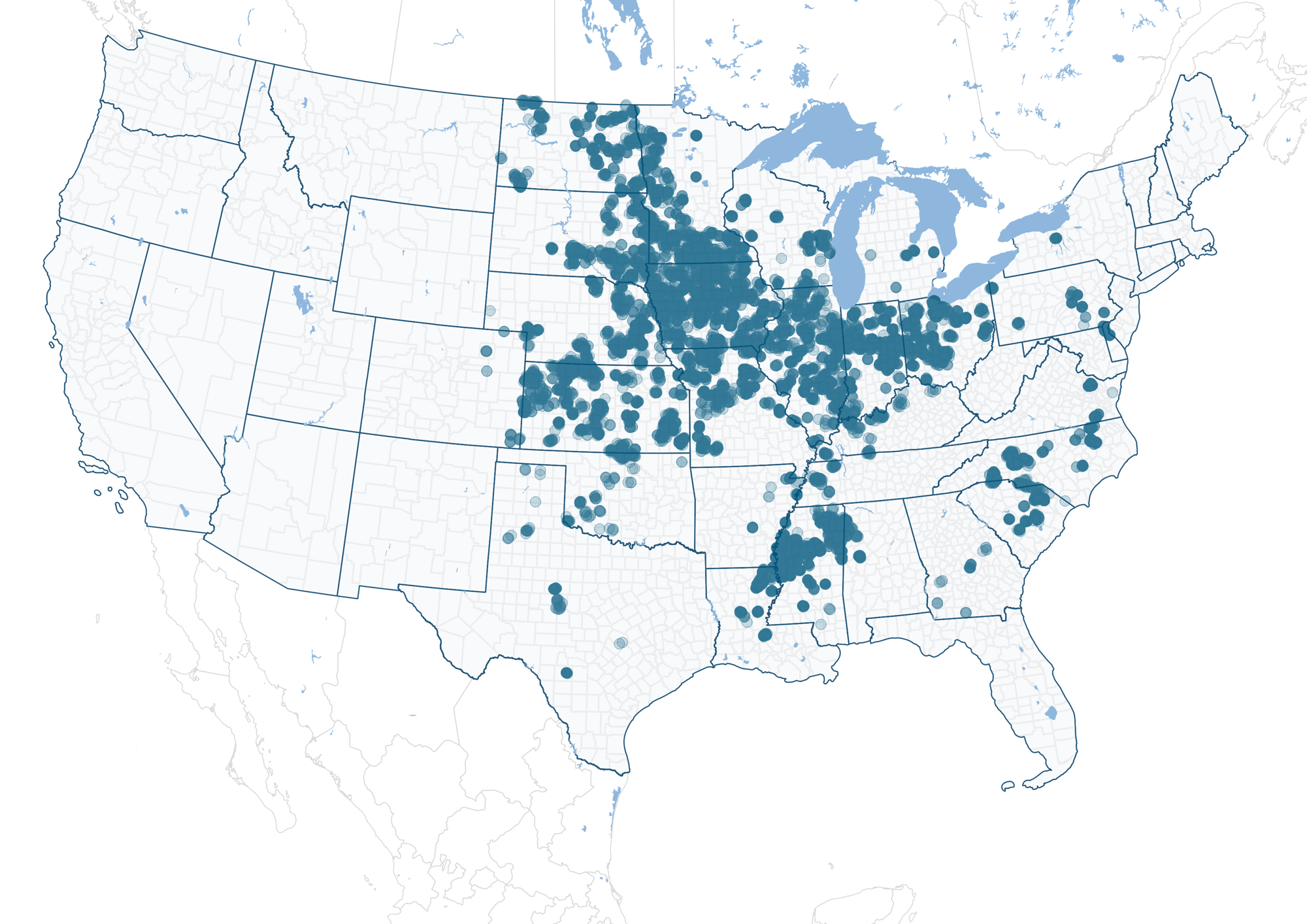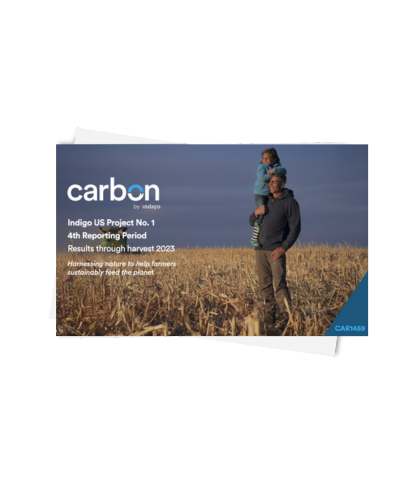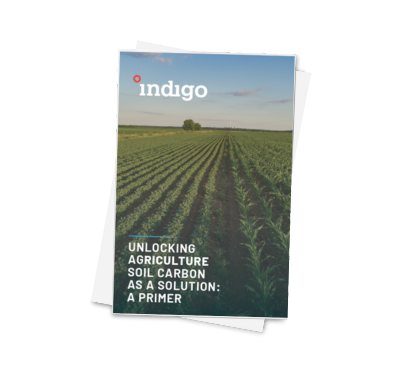Indigo U.S. Project No. 1 (CAR1459)
Everything you need to know

Project Overview
| Project Type | Agricultural Soil Carbon |
| Credit Type | Removals + GHG Abatement |
| Crediting Program | Climate Action Reserve |
| Methodology | Soil Enrichment Protocol |
| Project ID | CAR1459 |
| Location | United States |
| Project Start Year | 2018 |
CAR1459 unites thousands of U.S. farmers, covering over 7 million acres with enhanced sustainable agricultural practices. Indigo supports farmers through comprehensive outreach, agronomic guidance, advanced modeling, and digital data tools, incentivizing a transition to regenerative agriculture. These practices increase soil organic carbon storage, reduce greenhouse gas emissions, and enhance crop productivity and farmland resilience against natural disturbances, thereby reducing economic risks. Farmers gain new revenue streams through high-quality, registry-issued carbon credits, simultaneously boosting income and economic stability for rural families. Additionally, reduced use of synthetic inputs improves local air and water quality, benefits human and aquatic health, and promotes more nutritious food production.
 CAR1459 is registered with the Climate Action Reserve, using the Soil Enrichment Protocol v1.1. Founded in 2001, CAR is the premier offset project registry and standards organization in the world, and is either endorsed or approved by the ICVCM, ICROA, and CORSIA.
CAR1459 is registered with the Climate Action Reserve, using the Soil Enrichment Protocol v1.1. Founded in 2001, CAR is the premier offset project registry and standards organization in the world, and is either endorsed or approved by the ICVCM, ICROA, and CORSIA.
Meet Our Farmers
Paul Overby, North Dakota
Lance Unger, Indiana
Josh McClain, Kansas
Our Core Principles
Click on the dropdown to explore what they mean
Project Area
Growers in any of the lower 48 United States are eligible to enroll fields in CAR1459. During enrollment users identify field boundaries in our web-based Carbon application. Growers may enroll single fields, multiple fields, or even their entire farm operation. Field boundaries are reviewed to ensure adherence to the requirements of the CAR SEP v1.1.
Farmer Engagement
Indigo has been engaging with farmers around practices to reduce GHG emissions and build soil carbon since 2018. Over the years, we have deployed a range of engagement and consultation activities, including direct outreach (e.g., field days, conferences, events), surveys and interviews, email communications, webinars, customer service, and partnerships. These activities have allowed extensive two-way communication, providing growers with the details they need to make informed decisions and providing Indigo with crucial feedback to drive continuous improvement of our program design and implementation.
During the digital enrollment process, growers can review the terms and conditions of the Carbon contract. Our current contract has a 5-year term, which automatically renews annually thereafter. Growers acknowledge that Carbon by Indigo can only provide incentive payments for the impacts of management practice changes compared to historical management. In return, participating growers receive 75% of the revenue in the standard program from carbon credits to be sold based on their quantified performance, subject to vesting.
Additionality
Additionality is a foundational criterion for the creation of a carbon offset. Farmers are required to adopt a new change in management practices that must also pass the additionality tests in CAR SEP v1.1. Even as awareness of regenerative practices increases, farmers face significant financial, social, and cultural barriers to adoption. Crucially, farmers are risk averse. They perceive significant risks of adopting new practice changes, with very uncertain economic and agronomic rewards, given the perception that the business-as-usual management "just works." If you only get 40 growing seasons in your life, it's a tough call to mess with your farm's formula for multiple years in order to realize the benefits of more sustainable practices. Carbon revenues are necessary to overcome these risks and objections. Without the additional funding from carbon credits, farmers are less inclined to switch to regenerative agriculture practices that can improve yields and reduce carbon emissions because of the upfront cost and risk.
Data Collection
Indigo collects farm management data from growers across all fields enrolled in our project via our software platform. We collect 3-5 years of historical data, as well as current season details about farm management, to ensure that accounting is relevant to the project’s activities. Given growers are primarily focused on farming, Indigo has developed digital tools and integrations to ease and reduce the data collection process for farmers over the years. Proprietary remote sensing algorithms validate management data at scale. In addition to management data, Indigo captures soil data directly by collecting samples from random points within a stratified random sample of fields. Soil samples are handled according to strict protocols and are tested at NAPT-accredited laboratories for carbon content, bulk density, pH, and texture.
Quantification & Modeling
Indigo deploys a hybrid, measurement and model-based approach to quantify baseline and project emissions and generate credits. Both management data and soil samples are translated into model-ready inputs that drive our biogeochemical model, DayCent-CR, which was initially developed out of Colorado State University and has been used in hundreds of peer-reviewed publications. The DayCent-CR model has been calibrated, validated, and independently reviewed by experts in accordance with SEP requirements three times. Model outputs are combined with additional equations from the SEP to quantify soil carbon and GHG impacts for each cultivation cycle. Indigo calculates uncertainty, which accounts for sample error, measurement error, and model prediction error, and incorporates deductions to ensure that we are conservatively issuing credits. Leakage is monitored in relation to yield declines and displacement of livestock, with conservative deductions if it occurs.
Permanence
Credits issued from CAR1459 must remain permanent for at least 100 years, per the Soil Enrichment Protocol. Because CAR1459 is an aggregated project, with many farmers and fields across different regions, implementing practices at different times, permanence is assessed and maintained at the project level. While no project is without risk, we work to actively mitigate risks and manage possible reversals. During a field’s crediting period, they will undergo data collection and quantification during each reporting period. Fields that end their crediting period will continue to be monitored remotely to assess land use and/or land management changes that would imperil the stored carbon. Indigo contributes to the Climate Action Reserve’s buffer pool and monitors, reports, and compensates the registry for any re-emissions that may occur.
We’ve developed contractual terms and incentives that encourage continued adoption across multiple years. Farmers see increasing agronomic benefits over time, which are likely to improve a farming operation’s resiliency and financial sustainability in the long term. Overall, as farming operations become more financially sustainable, land-use change risk decreases.
Verification
CAR requires ex-post verification by an independent, ISO-accredited verification body. To date, Indigo has contracted with Aster Global Environmental Solutions due to their deep carbon verification experience and in-house expertise with soil science and agricultural management. Verification reports are available in the CAR registry as well as the document library below.
Beyond the project verification, there are other layers of outside review relevant to CAR1459. The Soil Enrichment Protocol was subjected to expert review and assessment, as well as multiple public comment periods. The DayCent-CR biogeochemical model has been calibrated and validated in accordance with SEP three times, and for each time we go through this process, an independent expert reviews and approves our calibration and validation.
Transparency
Transparency is core to how Indigo builds trust and drives progress. We openly share our methods, publish peer-reviewed findings, and welcome external review to ensure our results stand up to scrutiny. We’re clear about what we know, where uncertainty remains, and how we’re working to improve. While we ensure farmer information remains private and secure, by making our assumptions and results visible, we help partners, farmers, and the broader community make informed decisions with confidence.
Scientific Integrity
Our programs are grounded in rigorous research, advanced measurement tools, and continuous learning. We prioritize practices with strong scientific backing, validate our impact through independent review, and invest in research to close knowledge gaps. Our latest peer-reviewed study, published in the Journal of Environmental Management, analyzes our first three carbon credit issuances of nearly 300,000 high-quality credits issued at scale. We’ve also published research on ecosystem model calibration and emerging lab techniques to measure soil carbon.
Indigo is actively engaged in scientific partnerships. We are continuously working to advance the science of soil carbon and GHG emissions through collaborations with organizations such as NC State University, the Precision Sustainable Agriculture Network, National Indian Carbon Coalition, Indian Land Tenure Foundation, American Farmland Trust, Groundwork BioAg, Soil Health Institute, Dartmouth University, University of Michigan, US Geological Survey, USDA Agricultural Research Service, and others. We will continue to share our science and engage with the scientific community to support advancement and to help us identify areas where we can improve.
Non-GHG Impacts
Eligible management changes help reduce farm emissions, sequester carbon, and build carbon content in the soil. They also generate co-benefits, including improvements to soil health, water and nutrient availability, crop productivity and yield, habitat and species diversity, and resilience to extreme weather events. At a larger scale, these benefits mitigate climate change and improve resiliency, biodiversity, and water stewardship efforts. Over the first four reporting periods, practices adopted by farmers participating in CAR1459 have reduced more than 64 billion gallons of surface water runoff, improving water quality, reducing soil erosion, and making farms more resilient.
In addition, the program brings new revenue into agricultural communities, building increased economic returns for farmers and long-term financial sustainability that may support sustained operations for future generations. 75% of revenue generated from annual carbon credit sales is provided to participating farmers in the standard program, subject to vesting.
Reporting on CAR1459’s contributions to United Nations Sustainable Development Goals can be found in the Monitoring Plan in the project document library.
Project Metrics
| Reporting Period | Ending Harvest | Issuance Date | Credits Issued | Acres | Fields | Farmers |
|---|---|---|---|---|---|---|
| RP1 | 2020 | Jun 2022 | 22,225 | 100,371 | 1,184 | 175 |
| RP2 | 2021 | Feb 2023 | 111,389 | 423,740 | 5,083 | 427 |
| RP3 | 2022 | Feb 2024 | 163,048 | 1,289,360 | 15,766 | 972 |
| RP4 | 2023 | Apr 2025 | 630,634 | 1,517,893 | 20,248 | 1,086 |
| Total: | 927,296 |
Document Library
Select an issuance to find relevant documents
| File or Link | Description |
| Indigo Knowledge Base | Project information for farmers |
| CAR1459 Registry Page | Landing page for CAR1459 within the CAR registry system. Scroll down for a link to public project documents. |
| CAR Registry public reports | Home page for the Climate Action Reserve project registry. Public reports are available for credit issuances, retirements, and more. |
| Peer-reviewed article: Brummitt, et al (2024) | Solutions and insights for agricultural monitoring, reporting, and verification (MRV) from three consecutive issuances of soil carbon credits (2024, Journal of Environmental Management) |
| Peer-reviewed article: Mathers, et al. (Geoderma, 2023) | Validating DayCent-CR for cropland soil carbon offsets reporting at a national scale (2023, Geoderma) |
| Climate Action Reserve Soil Enrichment Protocol | The protocol (methodology) followed for the development and verification of CAR1459. |
| Model validation reports for DayCent-CR | The independently-reviewed model validation reports required for our use of DayCent-CR for project quantification. This page includes our reports as well as those of the independent expert reviewers. |
| AB1305 Disclosures | Simplified summary of key project characteristics as requested by California AB1305. |
| File or Link | Description |
| Monitoring Plan v4.4 | Complete overview and details of CAR1459, covering project design, methods, and protocol adherence. |
| Monitoring Report v4.4 | Quantification results for the reporting period |
| Verification Report | Description of the independent verification activities and outcomes. |
| Verification Opinion | Official conclusion of the independent verification process for the reporting period. |
| Supporting Documents | Additional documents referenced in the Monitoring Plan and Report that provide deeper details of aspects of the project development. |
| File or Link | Description |
| Monitoring Plan v3.4 | Complete overview and details of CAR1459, covering project design, methods, and protocol adherence. |
| Monitoring Report v3.6 | Quantification results for the reporting period |
| Verification Report | Description of the independent verification activities and outcomes. |
| Verification Opinion | Official conclusion of the independent verification process for the reporting period. |
| Supporting Documents | Additional documents referenced in the Monitoring Plan and Report that provide deeper details of aspects of the project development. |
| File or Link | Description |
| Monitoring Plan v2.1 | Complete overview and details of CAR1459, covering project design, methods, and protocol adherence. |
| Monitoring Report v2.2 | Quantification results for the reporting period |
| Verification Report | Description of the independent verification activities and outcomes. |
| Verification Opinion | Official conclusion of the independent verification process for the reporting period. |
| Supporting Documents | Additional documents referenced in the Monitoring Plan and Report that provide deeper details of aspects of the project development. |
| File or Link | Description |
| Monitoring Plan v1.1 | Complete overview and details of CAR1459, covering project design, methods, and protocol adherence. |
| Monitoring Report v1.1 | Quantification results for the reporting period |
| Verification Report | Description of the independent verification activities and outcomes. |
| Verification Opinion | Official conclusion of the independent verification process for the reporting period. |
| Supporting Documents | Additional documents referenced in the Monitoring Plan and Report that provide deeper details of aspects of the project development. |
Learn More About Indigo Credits

Annual Report
Learn more about how Carbon By Indigo generates credits in an excerpt of our annual report.
View Report
Carbon Introductory Primer
Discover how regenerative farming practices can unlock agriculture's potential to capture billions of tons of carbon each year, future-proofing farms and enhancing productivity for long-term success.
View Primer